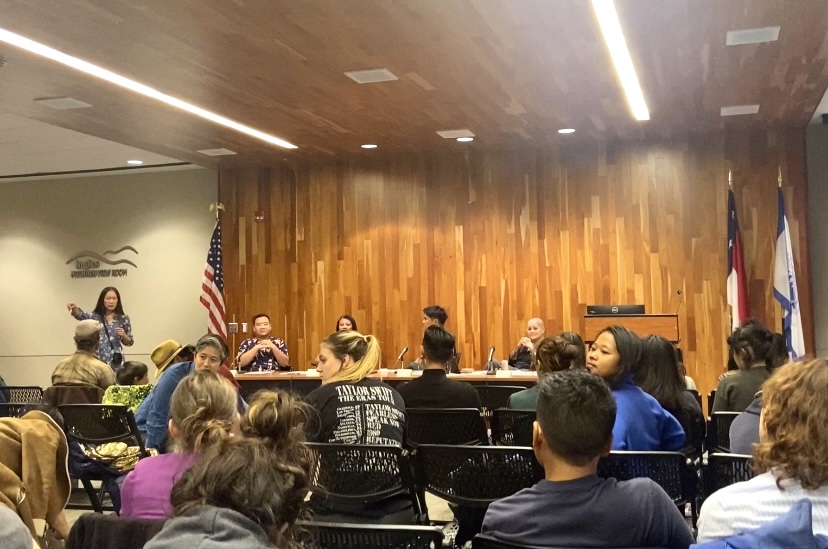Mental health practitioners vocalized the importance of culturally informed care at the Asian American Pacific Islander mental health panel on November 3 at UNC Asheville.
“One of the big things I think people should take away from this is the Asian American Pacific Islander group have very different experiences and backgrounds,” said An Truong, a mental health practitioner with Asian heritage.
Truong said, when interacting with the Asian population, people should always be reminded not to make assumptions.
“We might have some threads and cultural norms that tie us together, but in reality, we should remind ourselves of how vast Asia really is. For example, Northern and Southern Vietnam are vastly different, but it’s the same country,” Truong said.
Tai Kulenic, a mental health practitioner with Asian heritage, spoke about the term “model minority” during the panel discussion.
“It’s a responsibility and a burden. There is no model minority. There’s no way anyone could be a model for anything all the time,” Kulenic said.
Kulenic said there is a positive intention of implication behind it, but it is problematic and harmful as well with the obligation to succeed and the deep fear of failure.
“It leads to stereotypes and can put people of color against each other. I think it oversimplifies complex issues like race, class and scrutinization. I also feel like it can lead Asian Americans to feel like they are not individuals,” Kulenic said.
Tracy Hopkins, a mental health practitioner, talks about how she moved from South Korea to a small town in the United States when she was 10.
“People freaked out that we spoke a different language, and ate different foods. We were a whole spectacle. I was a quiet kid, I was obedient and I did really well in school, especially math,” Hopkins said.
Hopkins said she felt like she was known for her race and culture throughout most of her life, and was often seen as a model minority.
“From childhood to age forty, I was seen as the racially ambiguous Asian woman. I’m forty-six now, and the reason I say forty is because that is when I began my journey to figure out how to stand in my sacred ground and how to utilize my voice,” Hopkins said.
Eric Tran, one of the four mental health practitioner panelists said the stigma surrounding trauma can be confusing and cause someone not to seek help.
“As Asian Americans, we may be afraid that our experiences are not as traumatic as another person of color or minority,” Tran said.
Tran talked about his identity as a queer and Asian American man, and how it plays into mental health and societal norms.
“There is this idea like, can I be a queer man and an Asian man? Does my queerness exclude me from being Asian? Can I be Asian, but with the cognisant that I am queer? Why do any of these doors have to be closed? Why can’t they just be blown off of the hinges?” Tran said.
Kulenic said when seeking mental health care as an Asian American, there can be many barriers such as language, lack of culturally appropriate resources, the cost of health care, systemic racism and quality of care.
“I think stigma and shame are the biggest ones. There is so much behind that, like the thought process in which help-seeking is a sign of weakness, and your self-worth and value are whether or not you can take care of yourself, your family and community. I guess this kind of leads people to accept that this is just their fate,” Kulenic said.
Truong spoke about the possible benefits of having a mental health practitioner of your own background.
“I don’t think you necessarily need a practitioner of your same background to be able to do really great work, that practitioner just has to be really culturally aware. However, there is something to be said about this unspokenness when you walk into the room with someone who shares the same identity as you, and talk about your experience in ways you don’t have to explain to someone else,” Truong said.
Tran agreed with Truong and added to the conversation by stressing the power of choice when seeking professional help.
“It’s the idea of being able to choose who we see in the mental health and medical world. What does it mean if we really want emotional spiritual healing and the only people that can offer that to us are white? Does that mean we are allowing ourselves to rely on whiteness to heal?” Tran said.
Hopkins said this is why culturally informed care is so important in the first place.
“If you really look at some of the practices and protocols in mental health care that clinicians are being trained in, they are usually taking practices from Asian or African culture and embedding that into their informed work,” Hopkins said.


















